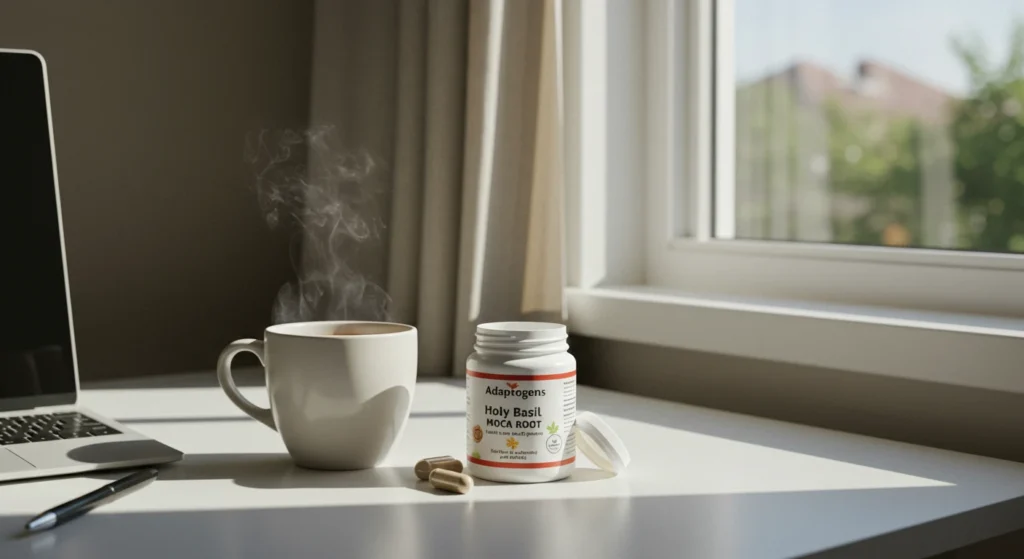Introduction
In our fast-paced world, chronic stress and anxiety have become common struggles. This is where adaptogens for stress and Anxiety, the best adaptogenic herbs, and natural supplements for anxiety come into play. These powerful plant-based substances have been used for centuries in traditional medicine, and now modern science is beginning to uncover their therapeutic potential. Adaptogens help the body resist stressors of all kinds, whether physical, emotional, or environmental.
These adaptogens for stress and anxiety don’t target a specific illness. Instead, they work holistically by regulating the adrenal system, which manages the body’s hormonal response to stress. The concept dates back to traditional Chinese and Ayurvedic medicine, but it was officially coined by Soviet scientist Dr. Nikolai Lazarev in 1947.
How Adaptogens for Stress Work in the Body

Balancing the HPA Axis
Adaptogens for stress and anxiety primarily act on the hypothalamic-pituitary-adrenal (HPA) axis, the central stress response system. When you experience chronic stress, this axis can become overactive, leading to hormonal imbalances, fatigue, and mood disorders.
Adaptogenic herbs gently modulate the HPA axis, helping reduce cortisol levels, increase energy, and improve mental clarity. For example, Ashwagandha, one of the best adaptogenic herbs, has been shown to lower cortisol levels significantly (Chandrasekhar et al., 2012).
Supporting Neurotransmitter Function
In addition to hormonal balance, adaptogens support neurotransmitters like serotonin, dopamine, and GABA, which regulate mood and anxiety. Some natural supplements for anxiety, such as Rhodiola rosea, enhance serotonin activity, offering mood-boosting effects without the side effects of synthetic drugs.
Best Adaptogenic Herbs to Combat Stress and Anxiety Naturally
Adaptogens are a unique class of natural supplements for anxiety that help the body maintain balance during physical or emotional stress. The best adaptogenic herbs not only promote resilience but also support the nervous system, hormonal balance, and sleep quality.
Let’s explore the top adaptogens for stress and understand how each can improve your overall mental well-being.
Ashwagandha – The King of Adaptogens for Stress Relief
Ashwagandha (Withania somnifera) is arguably the most renowned natural supplement for anxiety. Extensively studied, this powerful herb works by reducing cortisol levels, the primary stress hormone, and promoting a calm, restful state.
Benefits:
- Reduces anxiety and chronic stress
- Balances hormones
- Enhances sleep quality
Best For:
- Long-term stress management
- Insomnia
- Fatigue and burnout
“Ashwagandha root extract safely and effectively improves an individual’s resistance to stress and thereby improves self-assessed quality of life.”
— Chandrasekhar et al., Indian Journal of Psychological Medicine (2012)
Rhodiola Rosea – An Arctic Root for Energy and Focus
Native to cold mountainous regions, Rhodiola Rosea is one of the best adaptogenic herbs for boosting stamina and mental clarity. It’s particularly useful when dealing with mental fatigue, low energy, or mild depression.
Benefits:
- Enhances cognitive performance
- Fights physical and mental fatigue
- Elevates mood naturally
Best For:
- Burnout
- Brain fog
- Adrenal fatigue
A clinical study by Darbinyan et al. (2000) found that Rhodiola significantly reduced symptoms of fatigue and improved concentration in medical students during stressful periods.
Holy Basil (Tulsi) – The Sacred Herb for Calm and Clarity
Revered in Ayurvedic medicine, Holy Basil, or Tulsi, is a sacred herb known for its calming effects on both mind and body. It helps regulate cortisol levels and supports immune function, making it one of the top adaptogens for stress.
Benefits:
- Enhances mental clarity
- Reduces inflammation
- Balances emotional stress
Best For:
- Anxiety and mood swings
- Immune system support
- Inflammatory conditions
Lion’s Mane Mushroom – A Neuroprotective Adaptogen
Although technically a mushroom, Lion’s Mane functions like an adaptogen due to its powerful effects on the brain. It stimulates nerve growth factor (NGF), essential for neuron regeneration and emotional stability.
Benefits:
- Supports cognitive function and memory
- Reduces anxiety
- May help prevent neurodegeneration
Best For:
- Long-term brain health
- Stress-related memory loss
- Mood stabilization
Maca Root – The Peruvian Powerhouse for Hormonal Balance
Maca is a root vegetable native to the Andes and is prized for its ability to balance hormones and increase energy. While not a traditional adaptogen, it is often grouped with them for its remarkable ability to reduce stress-related symptoms and improve mood.
Benefits:
- Supports hormonal equilibrium
- Increases libido and stamina
- Enhances mood
Best For:
- Stress-induced hormonal imbalances
- Low libido
- Adrenal fatigue
Choosing Natural Supplements for Anxiety: How to Pick the Best Adaptogenic Herbs
Why Quality Matters When Selecting Natural Supplements for Anxiety
When it comes to managing stress and anxiety naturally, choosing the right adaptogens for stress can make a significant difference. With the growing market of natural supplements for anxiety, it’s crucial to focus on quality, sourcing, and efficacy.
Always opt for third-party tested products, which ensure that what’s on the label is exactly what’s in the bottle. Reputable brands often include certificates of analysis (COAs), proving their products are free from contaminants like heavy metals, pesticides, or fillers.
Additionally, choose full-spectrum extracts instead of isolated compounds. These preserve the herb’s full range of beneficial phytochemicals, enhancing their synergistic effects and absorption in the body.
“Full-spectrum herbal extracts offer a holistic representation of the plant’s therapeutic profile, supporting better outcomes in anxiety management.”
— American Botanical Council
Dosage and Timing of the Best Adaptogenic Herbs
Just like any health regimen, the timing and dosage of adaptogens play a key role in their effectiveness. While these herbs are generally safe, starting with small doses allows your body to adjust gradually and helps you observe how it responds.
- Morning: Rhodiola or Eleuthero can promote alertness and energy without overstimulation.
- Afternoon: Holy Basil tea may help prevent the mid-day stress slump.
- Evening: Ashwagandha or Reishi may be better choices to support relaxation and unplug for better sleep.
Always read the product instructions or consult with a healthcare provider to determine the most appropriate routine based on your needs.
Forms of Adaptogens for Stress and Their Benefits
One of the reasons adaptogens are so versatile is the variety of forms they come in, making it easy to incorporate them into your lifestyle:
- Capsules and Tablets: Ideal for convenience and precise dosing.
- Tinctures and Extracts: Highly concentrated and fast-acting; great for adding to drinks.
- Powders: Perfect for smoothies, soups, or energy balls ideal for those who prefer whole-food integration.
- Herbal Teas: Offer a soothing ritual with additional hydrating benefits.
Each form offers unique advantages. For example, tea encourages a calming moment of mindfulness, while capsules are perfect for those on the go. The choice ultimately comes down to personal preference, daily routine, and desired effects.
Scientific Backing on Adaptogens for Stress and Mental Health

What Research Says About Adaptogens for Stress and Anxiety
As modern life becomes increasingly fast-paced and overwhelming, many people are turning to natural supplements for anxiety to find calm and restore emotional balance. Among the most effective options are adaptogens for stress, which are now gaining scientific validation for their centuries-old therapeutic claims.
Several peer-reviewed studies have highlighted the profound impact of adaptogens on mental health, particularly in lowering cortisol (the primary stress hormone), improving resilience, and enhancing overall emotional well-being:
- Ashwagandha (Withania somnifera): In a 2012 double-blind, placebo-controlled study by Chandrasekhar et al., participants who consumed Ashwagandha root extract experienced a significant reduction in cortisol levels and improved sleep quality, confirming its powerful anti-stress properties Source: Indian Journal of Psychological Medicine.
- Rhodiola Rosea: According to research published in Phytomedicine (Darbinyan, 2000), Rhodiola supplementation led to marked improvements in symptoms of burnout and mild-to-moderate depression, making it one of the best adaptogenic herbs for mental exhaustion and fatigue.
- Holy Basil (Ocimum sanctum): A study conducted by Jamshidi & Cohen in 2017 revealed that Holy Basil extract significantly reduced stress, anxiety, and mild depression, supporting its role as a natural anxiolytic Source: Journal of Ayurveda and Integrative Medicine.
These findings support what ancient healing systems have long practiced: that adaptogens for stress can help bring balance to the mind and body in a holistic and sustainable way.
Ancient Wisdom Behind the Best Adaptogenic Herbs
The concept of adaptogens is not new. In fact, many of the best adaptogenic herbs have been used for thousands of years across various healing traditions.
- In Traditional Chinese Medicine, Ginseng has been revered as a Qi-tonic used to increase life force energy and enhance mental clarity.
- In Ayurveda, Ashwagandha is a foundational herb for reducing “Vata” imbalances, which are believed to drive anxiety, restlessness, and fatigue.
- Siberian Rhodiola, used by Russian soldiers and astronauts during the Cold War, was known to improve endurance, reduce fatigue, and enhance mental performance under stress.
This powerful synergy of modern science and ancient wisdom makes adaptogens not only relevant but essential in today’s wellness landscape. Their ability to normalize physiological functions, reduce stress hormones, and improve energy without overstimulation sets them apart from synthetic medications or stimulants. use across cultures. From Chinese ginseng to Siberian Rhodiola, these herbs have been trusted for centuries for their healing power.
Digital Detox Mental Health: How to Combine Adaptogens with Unplugging Strategies

Integrating a digital detox with powerful adaptogens for stress can dramatically improve your mental health, reduce anxiety, and enhance emotional balance. This combined approach addresses both external and internal sources of stress making your journey to wellness more effective and sustainable.
In today’s hyper-connected world, carving out time to unplug for better sleep and mental clarity is no longer optional; it’s essential. By supplementing your digital detox with the best adaptogenic herbs and trusted adaptogens for stress and anxiety, you’ll effectively support your body’s ability to reset, rebalance, and recharge, promoting lasting mental and physical well-being.
Step-by-Step Guide: How to Do a Digital Detox with Adaptogens
Let’s break down a practical digital detox plan that you can start today—enhanced by natural supplements for anxiety to calm your mind and body.
🕐 1. Set Clear Boundaries
Start by establishing screen-free hours in your day. For example:
- Avoid phones and computers during meals.
- Turn off all screens an hour before bed.
- Use a traditional alarm clock instead of your phone in the bedroom.
Setting boundaries helps signal your nervous system to shift from hyper-stimulated to calm and focused.
🔍 Pro Tip: Create a “digital sunset” each evening by dimming lights and disconnecting from screens 90 minutes before bed.
🍵 2. Create a Calming Space with Adaptogens for Stress
Build a wind-down routine infused with the calming power of adaptogens:
- Drink a warm cup of Holy Basil (Tulsi) tea in the evening.
- Use essential oils like lavender or adaptogenic blends to signal relaxation.
- Add Ashwagandha tincture to your nighttime routine to support adrenal recovery.
These natural supplements for anxiety work synergistically with your detox by lowering cortisol levels and improving emotional balance.
🏃♂️ 3. Stay Active to Maximize Detox Benefits
Engaging in daily movement like yoga, brisk walks, or dancing boosts dopamine levels and helps you release tech-related tension.
Pair this with energizing adaptogens for stress, such as Rhodiola Rosea in the morning, to enhance stamina and mood throughout the day.
😴 4. Unplug for Better Sleep with Adaptogens
Digital overstimulation is one of the leading causes of poor sleep hygiene. Blue light emitted from devices suppresses melatonin, making it harder to fall and stay asleep.
To unplug for better sleep, try:
- Turning off all screens 1–2 hours before bed.
- Using sleep-supporting adaptogens like Ashwagandha, Reishi Mushroom, or Lemon Balm to ease into rest naturally.
- Listening to calming music or practicing breathwork.
📘 A study published in The Journal of Clinical Sleep Medicine found that reducing screen time before bed improves both sleep quality and mental health outcomes.
Helpful Tools to Support Your Digital Detox Mental Health Plan
Ironically, some apps can help you unplug more effectively. Here are a few tech tools that encourage mindfulness:
- Freedom: Blocks distracting apps and websites during focus hours.
- Forest: Gamifies screen-free time by growing virtual trees as you stay offline.
- Headspace: Offers guided meditations to reset your mind and reduce tech-induced stress.
By using these tools mindfully, you create a bridge between technology and well-being without falling into overuse.
Adaptogens for Stress in Everyday Life

In today’s fast-paced world, stress is practically unavoidable. Many people are now turning to adaptogens for stress as a natural way to restore balance in both body and mind. These powerful, plant-based compounds have been used for centuries in Ayurvedic and Traditional Chinese Medicine. Modern science is finally catching up, confirming that natural supplements for anxiety like adaptogens can help reduce cortisol levels, improve energy, and promote emotional resilience.
According to Dr. Brenda Powell from the Cleveland Clinic’s Center for Integrative and Lifestyle Medicine, “Adaptogens help your body handle stress more effectively by regulating hormone levels and supporting your adrenal system” (Cleveland Clinic, 2021).
But how do you incorporate the best adaptogenic herbs into your daily life for maximum benefit?
Morning Routine: Energize Naturally with Rhodiola
Start your day with Rhodiola Rosea, one of the most researched adaptogens for stress. Known for its ability to enhance energy, focus, and stamina, Rhodiola is best taken in the morning when your cortisol levels are naturally higher. Simply add a Rhodiola powder or extract to your morning smoothie, oatmeal, or tea.
This herb not only combats fatigue but also improves cognitive function perfect for getting through busy mornings without relying solely on caffeine.
✅ Pro Tip: Choose a Rhodiola supplement standardized to at least 3% rosavins and 1% salidroside for optimal effects.
Afternoon Reboot: Maca Root or Holy Basil Tea
As the afternoon slump sets in, it’s a great time to enjoy adaptogens like Maca Root or Holy Basil. These natural supplements for anxiety promote mood balance and mental clarity. Maca, a Peruvian root, is known for balancing hormones and boosting endurance, while Holy Basil (Tulsi) helps lower cortisol and promote calmness.
Brew a warm cup of Tulsi tea or add Maca powder to your protein shake or energy bar.
Evening Wind-Down: Ashwagandha for Deep Relaxation
In the evening, winding down is essential for quality sleep and mental restoration. Ashwagandha is among the best adaptogenic herbs for nighttime use due to its calming, sedative-like properties. It helps reduce nighttime cortisol levels, which can interfere with restful sleep.
Take it in capsule or tincture form about 30 minutes before bed. You can also add it to warm almond milk for a soothing sleep tonic.
🔬 A 2019 study published in the Cureus Journal of Medical Science found that Ashwagandha significantly improved sleep quality and reduced anxiety in adults experiencing insomnia.
Consistency Is Key with Natural Supplements for Anxiety
While it’s tempting to try everything at once, it’s important to understand that adaptogens for stress work best with regular, consistent use. It can take anywhere from a few days to several weeks to notice their full effects, depending on your body and stress levels.
Start with one or two natural supplements for anxiety, observe how your body responds, and adjust accordingly. Always consult a healthcare provider, especially if you’re taking medications or have underlying health conditions.
Safety First: Important Considerations When Taking Adaptogens for Stress and Anxiety
While adaptogens for stress and natural supplements for anxiety are widely considered safe and well-tolerated by most people, there are essential health considerations to keep in mind. Even the best adaptogenic herbs can interact with medications or health conditions if not used properly.
Let’s explore when you should seek medical advice before adding adaptogens to your wellness routine.
Pregnant or Nursing? Speak with Your Healthcare Provider First
Although natural, not all adaptogens for stress have been rigorously studied for safety during pregnancy or breastfeeding. Herbs like Ashwagandha and Rhodiola, for instance, may affect hormone levels or uterine activity, potentially posing risks to both mother and baby.
Therefore, if you’re pregnant or nursing, it’s essential to consult your obstetrician, midwife, or a qualified herbalist before incorporating any natural supplements for anxiety into your daily routine.
🔍 According to the National Center for Complementary and Integrative Health (NCCIH), herbal supplements during pregnancy should be approached with caution due to the lack of clinical research in this population.
Medication Interactions: Thyroid, Blood Pressure, and More
If you’re currently taking medications especially for thyroid regulation, blood pressure, or mental health some adaptogens may interfere with drug efficacy or cause unwanted side effects.
For example:
- Ashwagandha may enhance thyroid function, which could interfere with synthetic thyroid medications like levothyroxine.
- Licorice Root, another adaptogen, can raise blood pressure and potassium levels if used excessively.
- Rhodiola may increase the stimulating effects of antidepressants or interfere with SSRIs.
To avoid complications, always disclose your supplement plans with your physician or pharmacist.
Autoimmune Conditions: Proceed with Caution With Adaptogens for Stress and Anxiety
People with autoimmune disorders such as lupus, multiple sclerosis, or rheumatoid arthritis should be particularly careful. Some adaptogenic herbs can stimulate the immune system, which may exacerbate symptoms or flare-ups in autoimmune conditions.
For example, Echinacea and Ashwagandha have immunomodulatory effects that might not be appropriate in these cases. While they may support overall health in many people, they can be counterproductive for individuals with overactive immune responses.
📘 A review published in Frontiers in Pharmacology (2020) highlighted that some adaptogens can influence immune signaling pathways, making professional guidance critical for autoimmune patients.
Best Practices When Using Natural Supplements and Adaptogens for Stress and Anxiety
To get the most from your adaptogens for stress while minimizing any risks:
- Start with low doses and observe how your body responds.
- Avoid combining multiple adaptogens at once until you understand how each one affects you.
- Purchase from reputable brands that offer third-party testing and clear dosage instructions.
- Keep a symptom journal to track any side effects or improvements.
- Consult your healthcare provider especially if you have chronic conditions or take prescription medications.
Final Thoughts on the Best Adaptogenic Herbs for Modern Life
Adaptogens offer a powerful, natural way to manage the mental and physical toll of everyday life. Whether you’re looking to improve focus, sleep better, or simply feel more balanced, these herbs can provide lasting support.
However, they work best as part of a holistic lifestyle that includes a healthy diet, movement, social connection, and digital balance.






